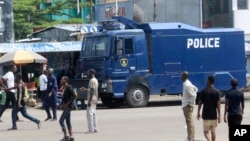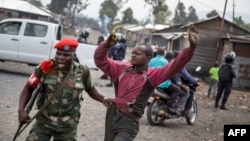U.N. human rights officials in the Democratic Republic of Congo say at least 20 people have been killed since Monday in sporadic clashes between protesters and security forces. President Joseph Kabila’s second elected mandate expired at midnight, but he remains in office, and the country’s top opposition leader has called for a campaign of “peaceful resistance.”
As midnight approached Monday, much of Kinshasa was filled with whistling and the banging of pots and pans to mark the end of the president’s second and, according to the constitution, final term in office.
The celebrations gave way to clashes between small groups of demonstrators and security forces and gunfire was heard in opposition neighborhoods. Sporadic clashes continued Tuesday and local media reported an office building belonging to Kabila’s political party and a police headquarters were set on fire.
U.N. Joint Human Rights Office in the DRC Director José Maria Aranaz told VOA his team is working to verify what he called “credible reports of excessive use of force and live ammunition by military police" at the University of Kinshasa. He said security forces have denied the U.N. office access to the university and threatened its staff.
VOA visited opposition areas and saw evidence of the street battles.
In Matete, an opposition area, Peter Kabongo, tells VOA that security forces spent the night shooting teargas and live rounds, as well as arresting people. According to Kabongo, their purpose was to intimidate the population.
Soldiers and police have been patrolling Kinshasa and other cities since last week and political demonstrations have been banned since September.
Kabila’s chief diplomatic adviser Barnabe Kikaya bin Karubi said the measures are justified.
Karubi said Monday the level of tension throughout the DRC justifies the massive deployment of security forces in cities. He blamed the media for presenting December 19, the last day of Kabila's term, as an "apocalyptic date.”
The Constitutional Court ruled earlier this year Kabila can stay in office until the electoral commission is able to organize elections. He named a new unity government late Monday under terms of a deal signed last month that provisionally schedules polls for April 2018.
But the preeminent leader of the Congolese opposition for more than 35 years, Etienne Tshisekedi, addressed the nation in a video statement shared online.
He says “I launch a solemn appeal to the Congolese people to not recognize the illegal and illegitimate authority of Joseph Kabila and to peacefully resist this coup d’état.” He accused Kabila of “high treason.”
Tshiskedi says the opposition platform he heads, le Rassemblement, will resume negotiations with the president’s political alliance Wednesday, following a four-day suspension. The opposition is calling for polls during 2017 and for Kabila to commit to not running in the next presidential election.





